


This summary for Game Three was written by Eauxps I. Fourgott. Many thanks for volunteering to put this report together! 
Our third game of the season promised a classic "Good vs. Evil" matchup, pitting three high peaceweight leaders against three low peaceweight leaders on a relatively small map. Leading the low peaceweights was the Pool One leader, Gilgamesh, whose strong performances leading to championship appearances in the past two seasons made him the heavy favorite here in the picking contest, despite a fairly cramped starting position. The high peaceweights were headlined by the Pool Two leader, Asoka, who tends to prosper in peaceful games and had been in the playoffs three times, but here had a central starting location that could draw aggression from the entire low peaceweight team. As for the unseeded leaders, we had one of the big warmongers in Shaka, stuck in a tiny corner of the map next to the two seeded leaders, and then a trio of wonder hogs in Ramesses II, Qin Shi Huang, and Augustus Caesar. Qin and Augustus in particular had ideal setups to sit back and play peaceful builder's games if they wanted, with pretty spacious land to expand into, stone at Caesar's capital, and a nice peaceful meat shield between them and the two more aggressive leaders.
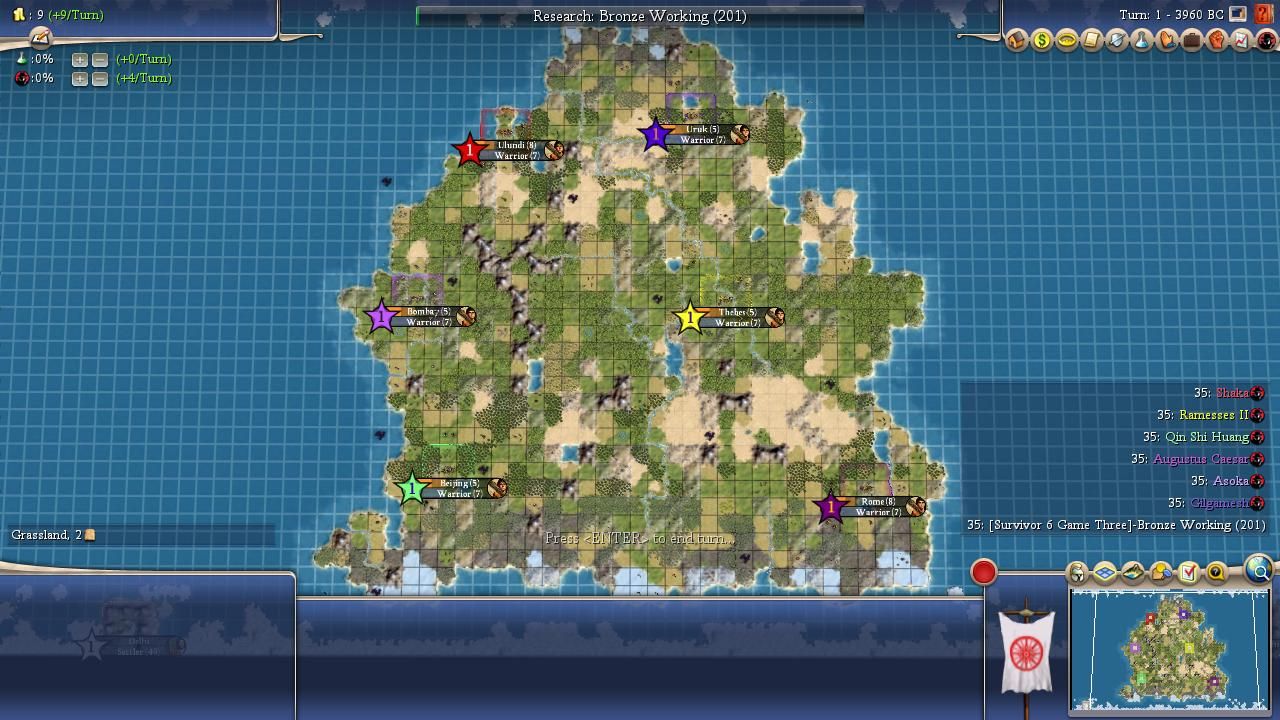
As the only leader in this match to start with Mysticism, Asoka was guaranteed a religion if he wanted it, and he indeed took that opportunity to found Buddhism. Of the other leaders, Ramesses and Gilgamesh both targeted the Meditation religion, but Ramesses was able to tech slightly faster, beating Gilgamesh by a single turn to found Islam. Very notably, both peaceful leaders had chosen to send their free Deity settlers to the north, towards Gilgamesh and Shaka. The two warlike leaders were already tight on space, and now they'd have to deal with nearby Holy Cities pumping out culture nearby, restricting their options even further. Ramesses' holy city of Memphis in particular, situated just three tiles from Gilgamesh's second city of Eridu, would generate border tension almost immediately, and made a fight between those two leaders all but inevitable. Meanwhile, this was perfect news for Qin and Augustus in the south, leaving them plenty of land to freely expand into.
Throughout these early turns, the focus continued to be on the north. Both Ramesses and Shaka sent their third cities towards Gilgamesh as well, severely cramping the Sumerian leader. Gilgamesh expanded quickly early on here, the first leader to have five cities, but he was quickly running out of room to found more. Ramesses had a dominant opening, building Stonehenge in Memphis to dial up the cultural pressure even more, then getting the Islamic shrine built there as well before Turn 50. The one big concern for him had been the fact that he had no copper anywhere near his starting position, but he made up for that by beelining Iron Working at an early date, ruling out the possibility of an early attack hamstringing him due to lack of metals. On the flip side, Shaka was looking very weak, just as cramped as Gilgamesh, and with no source of culture as he predictably refused to research Mysticism early on. He, too, went for an early Iron Working, and he had a guaranteed source at his capital, so it was very possible that he would simply try to fight his way out of this confining start.

The turns went by and the leaders continued to expand. As the landgrab phase came towards a close, Gilgamesh sat atop the scoreboard, having played his start as well as possible. He'd had limited room to found cities, but he sent out settler after settler to make sure he claimed every scrap of land he could, and his free Creative culture made sure he had a solid border. Ramesses was close behind, although he'd been slower to expand and was riding more on all the points from his early religion and Stonehenge. Still, he had a solid position, a good economy, military parity, and the extra space to expand that Gilgamesh lacked, and the two northern leaders had already picked up his Islam, ramping up that shrine income and giving him a better chance at having religious allies.
Augustus and Qin sat in the middle of the scoreboard, having expanded in peace so far with little of note happening. But while Augustus had played a pretty standard, competent opening, so far, Qin was a completely different story - he had expanded too quickly, before researching techs that would allow him to improve his economy, and a lack of any rivers near his starting position left him without any good source of income. As a result, he totally crashed his economy, to the point that checking the financial screen revealed that he was LOSING money at 0% science!  His units were on strike and he was completely stymied right now. He was researching Pottery for some much-needed cottages, but since he couldn't invest any money at all into the research, he still had 20 turns until he would get the tech. Qin was in the middle of the scoreboard for now, but this dire situation would soon send him to the bottom. He had knocked himself out of contention through this mismanagement - a nice illustration of how city maintenance can bite you in the butt in Civ 4!
His units were on strike and he was completely stymied right now. He was researching Pottery for some much-needed cottages, but since he couldn't invest any money at all into the research, he still had 20 turns until he would get the tech. Qin was in the middle of the scoreboard for now, but this dire situation would soon send him to the bottom. He had knocked himself out of contention through this mismanagement - a nice illustration of how city maintenance can bite you in the butt in Civ 4!
At the bottom of the scoreboard were Shaka and Asoka. Shaka had worked to grab what land he could, even throwing down a city far to the south, between India and Egypt, but 80 turns into the game, there was no sign of him researching any techs that would allow him to put culture in his cities, and next to two religious leaders and a Creative one, he was getting horribly squeezed. But he was at least doing better than Asoka, who had sat on his first three cities without expanding for a long time (perhaps because of the long row of peaks a short distance to his east confusing him), and so had just four cities at a time when nobody else had less than six. Between this poor landgrab, a poorly managed economy that had him teching slower than anybody except Qin at this time, and the fact that four of the other five leaders regarded him as their worst enemy, he was the odds-on favorite for First to Die.
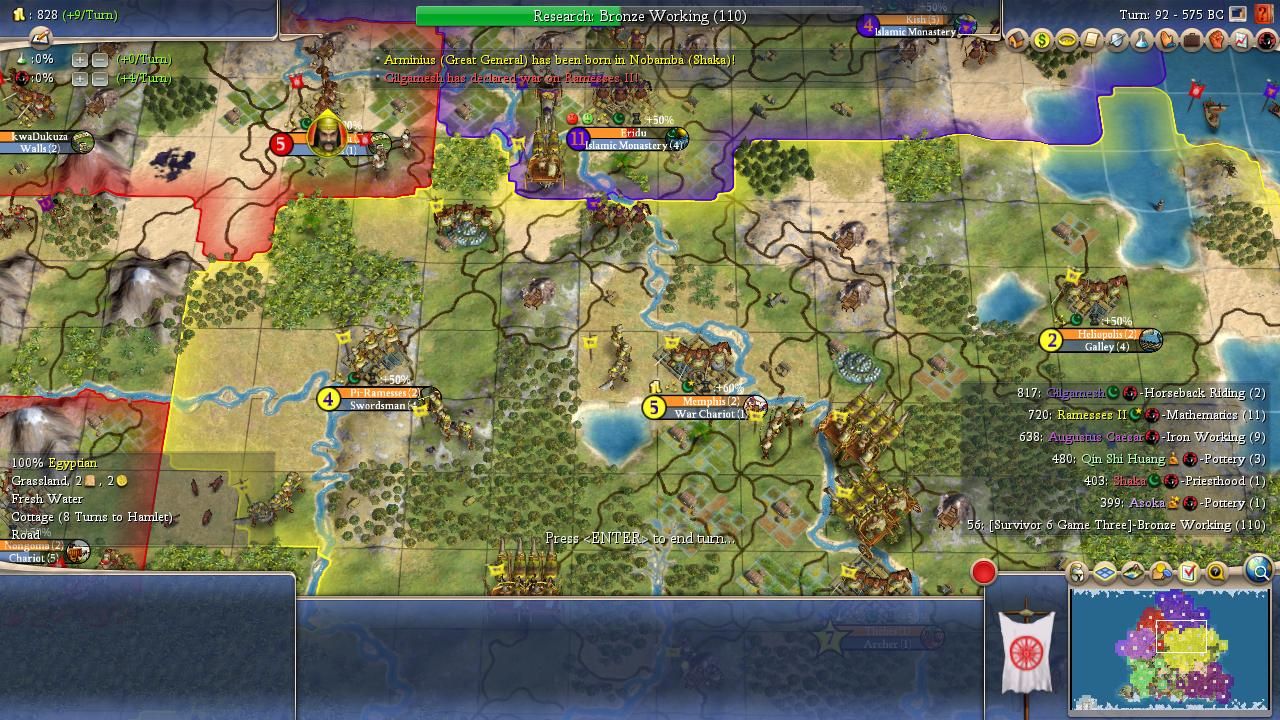
The first war declaration was no surprise, the ever-aggressive Shaka declaring on his peaceweight and religious rival, Asoka. However, Shaka simply didn't have the tools to make headway, even in an attack on his fellow bottom-dweller. Asoka had copper, and his closest city was his Holy City, on a hill with 50% defenses. As lightly as he was defending it, it was still enough to stymie a pre-Construction Shaka and send this war into a stalemate. Over to the east, we had a much more impactful war declaration, as Gilgamesh chose to attack Ramesses. Their shared religion had boosted them to Pleased relations with each other, but that still wasn't enough to prevent hostilities, as all the border pressure caused by Ramesses's Holy City must've irked Gilgamesh to no end. These were the top two leaders of the early game going at it - if we could get a decisive winner from this war, he would likely go on to win the game. We expected it to be tough going for Gilgamesh here - Ramesses had connected iron some time ago, Gilgamesh was several techs away from Construction for catapults, and the closest Egyptian city, holy city Memphis, had a stout 60% cultural defense. But Ramesses made a grave tactical error here, only putting a mere five units in Memphis, and that allowed Gilgamesh's much larger stack to simply march up, punch through, and take the city right at the outset of the war! That was a potentially decisive blow by Gilgamesh, and we wondered if this was the start of a quick conquest of Egypt, especially as no counter-attack seemed to be in order by Ramesses. As Gilgamesh sent reinforcements down, it looked like Memphis would hold steadily Sumerian - but after about ten turns, Ramesses finally came up with a big stack that was able to get the edge over the new defenders and take back the city. That was a close shave for Ramesses, and now that he'd recaptured his city, he proceeded to sign peace with Gilgamesh. Except... Ramesses handed over his Holy City in the peace deal!
What in the world, Ramesses?!?  This was an unbelievably stupid move, a horrible mistake that would alter the flow of the game. Ramesses had just undertaken a major military operation to successfully retake this city, it had a shrine already worth over 15 gold/turn in it, and it had been the flower of the Egyptian kingdom - and now he just hands it over and erases all the culture that he had accumulated in it. Ramesses had still settled enough other cities to be running even with Augustus in second place for now, but this set Gilgamesh a level ahead of him, and if he ever came attacking again, this would put Ramesses in a much tougher spot indeed.
This was an unbelievably stupid move, a horrible mistake that would alter the flow of the game. Ramesses had just undertaken a major military operation to successfully retake this city, it had a shrine already worth over 15 gold/turn in it, and it had been the flower of the Egyptian kingdom - and now he just hands it over and erases all the culture that he had accumulated in it. Ramesses had still settled enough other cities to be running even with Augustus in second place for now, but this set Gilgamesh a level ahead of him, and if he ever came attacking again, this would put Ramesses in a much tougher spot indeed.

Elsewhere on the map, Shaka found his first success by taking a small border city that Asoka had founded, but he still proved unable to make further headway in this war. Augustus had quietly continued to expand and build up a strong empire, with 11 cities to Gilgamesh and Ramesses' 9, and he had seven coastal cities currently benefiting from the Great Lighthouse to further bolster his economy. On the other hand, Qin continued to stagnate. Teching Pottery didn't have any immediate effect; his economy continued to sputter along, and it took him over ten turns to research Fishing of all techs! All of his cities were sitting for turns on end building nothing, with no buildings to construct and China lacking the economy to support more units. As far as religion, Islam had spread far and wide, with everybody except Asoka practicing the faith. This further painted Asoka as the likely first to die, while the religion's wide spread provided Gilgamesh with a nice big income from the captured shrine.
The turns went by with little happening. Shaka suicided a giant stack against the defenses of Asoka's Holy City right before teching Construction for catapults, ensuring that his lack of progress would continue even though he steadfastly refused to sign peace. Qin finally got enough cottages online to drag his economy out of the gutter and finally be able to research again, but he had spent over 20 turns with a lower GNP than even the observer civ. That time had left its mark and left him solidly in last place. He tried to make the best of a bad situation with an opportunistic war declaration against Asoka, but even though India was at just four cities and stuck at war with the Zulu, they were still able to fend off China's backwards military without breaking a sweat. Gilgamesh was flying through the tech tree, for a while researching at least twice as fast as everybody else. His Islamic shrine and unique building Ziggurats were giving him an early economic advantage over Ramesses and Augustus and helping him to build a strong tech lead over them, but it couldn't last forever. The Egyptian and especially Roman empires were larger and had a higher economic ceiling, and over time they strengthened to realize that potential and start to surpass Sumeria in research rate. Gilgamesh had played well so far and gotten a great break when Memphis was handed over to him, but he still didn't have enough land and needed to get more somehow. Seeing this, he decided to make the next significant move of the game, launching an attack against Asoka on Turn 172.
For all that he had played a terrible game the whole way through, Asoka had held on admirably, continuing to fight off both the Zulu and Chinese armies without giving up his hold on any of his four core cities. But once one of this game's real players came calling, there was no way that he could continue to hold on. Ramesses threw his hat into the ring as well, declaring war just a couple turns later, and now it was a giant free-for-all to see who would get India's four cities. Gilgamesh drew first blood with the city of Varanasi, and then came close to taking Bombay as well, only to come up just short and see Qin snipe the city instead. A four-on-one battle at the Holy City of Vijayanagara saw Shaka's long centuries of fighting finally pay off, as he finally got the prize he had been struggling for. That left the coastal city of Patiliputra as Asoka's last stand, and ultimately Gilgamesh was able to perform the honors and strike the killing blow:

You would never guess from this game that Asoka had won two games and made the championship last season; he played a complete abortion of a match in this one. He failed utterly to expand, stopping on just three cities and never having more than five, and he also failed to capitalize on his early religion the way Ramesses had, not constructing the early shrine and not spreading his religion around, to the point where everybody else in the world was practicing Islam and hated his guts. He did a nice job of holding on against attacks by the other weak leaders in the game, but he was never in a position to make gains against them, and it was curtains once a strong leader came his way.
Since India had been so small, nobody came out of this war particularly far ahead. Gilgamesh picked up a pair of cities, and that might be enough to give him an edge over Ramesses, but he remained some distance behind Augustus on the scoreboard. Shaka was able to stop fighting for the first time in ages, and had carved out more land for himself while picking up two cities that fit naturally into his borders, but he was still irreparably far behind the leaders. Qin got a big prize in the Indian capital, but he had bigger problems to worry about: turns before Asoka's exit, Augustus had made his first big move of the game by declaring war on Qin, and he meant business. There was no drama, no uncertainty, regarding this fight; Augustus's army was bigger, it was better in terms of technology, and China crumpled immediately. After the first few city captures, Augustus slowed down a little bit, but that was only due to the logistics of healing his stacks and moving them around the map. There was no hope for Qin, nobody made a move to stop Augustus, and so the Chinese leader exited a mere 35 turns after Asoka:
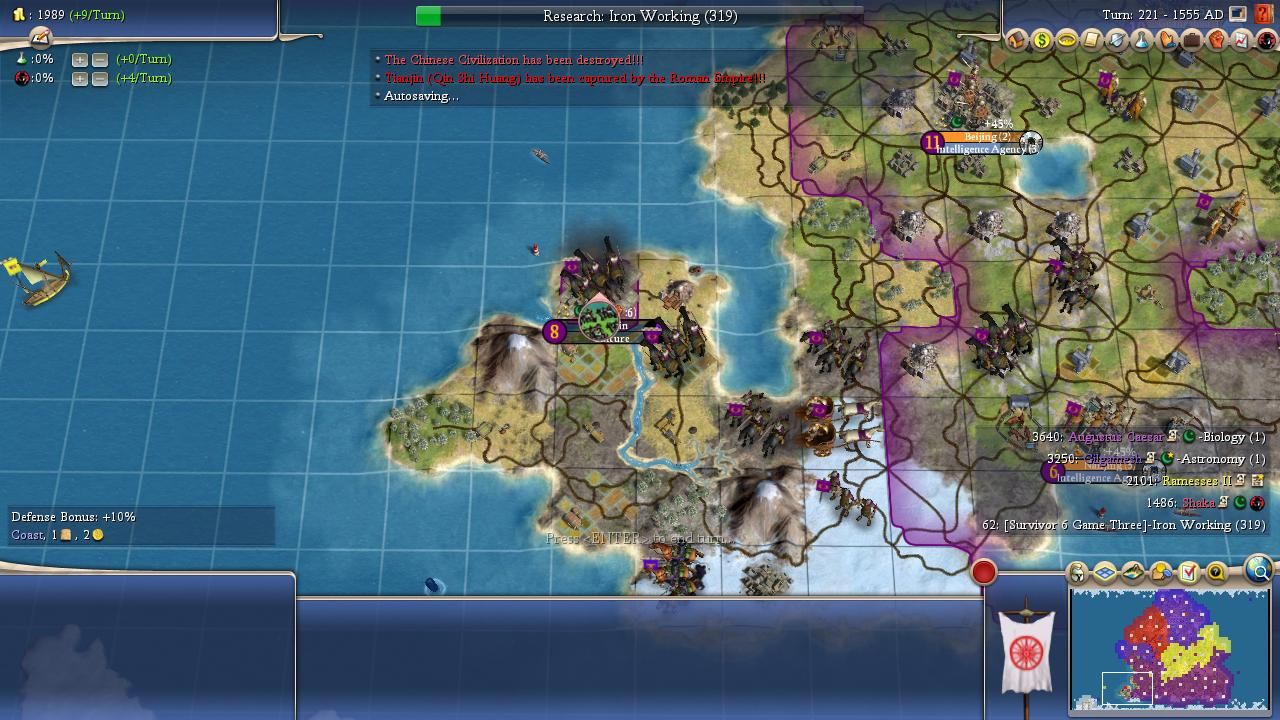
Qin had a great position in this game, with plenty of land, nobody bothering him for ages, and an inert northern neighbor who barely expanded, but he completely tanked his game by crashing his economy harder than we've seen in any other AI Survivor game. He ultimately played so poorly that he was forced to spend tens of turns researching basic techs at the minimum rate, and that left him in far too large of a hole to escape from, instead stuck sitting as easy prey for whichever stronger leader wanted to take advantage first. And that leader turned out to be Augustus, who had already been winning this game and had now strengthened his lead by adding an entire second empire's worth of land.
Meanwhile, the two northern warmongers were not just sitting back and watching during this time: Shaka and Gilgamesh wasted little time in starting to plot war again, and both declared on Ramesses just a few turns apart. Ramesses had made a foolish error by converting to his self-founded religion of Confucianism after Asoka's ouster - a mistake that he never would have made had he not signed over the Islamic Holy City earlier - and that left him as the pariah of an Islamic world. He at least had the sense to tech Rifling relatively early on the tree, early enough to upgrade some of his military before the aggressors came calling. But Gilgamesh had researched Rifling first, along with Military Tradition for cavs, and he'd been building up specifically for war to give him the advantage, even before you factor in the damage Shaka could do through sheer numbers and an early Military Science tech to give him grenadiers. That advantage turned out to be decisive, as Gilgamesh immediately punched through to take Ramesses' capital of Thebes, and from there the collapse was on. This time there was no counterattack from Egypt, no illusions that he could put up a fight. The war slowed to a crawl after the first few city captures, but that was only because Gilgamesh was marching giant stacks up to Egyptian cities, only to then have them sit and wait while one or two siege weapons chipped away at the city defenses, classic AI style. This delay even cost Gilgamesh, as while he was slowly sieging down eastern cities, Shaka was attacking and taking cities in the west. Thus, while Gilgamesh still took the lion's share of Egypt, Shaka was able to take four cities of his own, including the final city to score the kill:
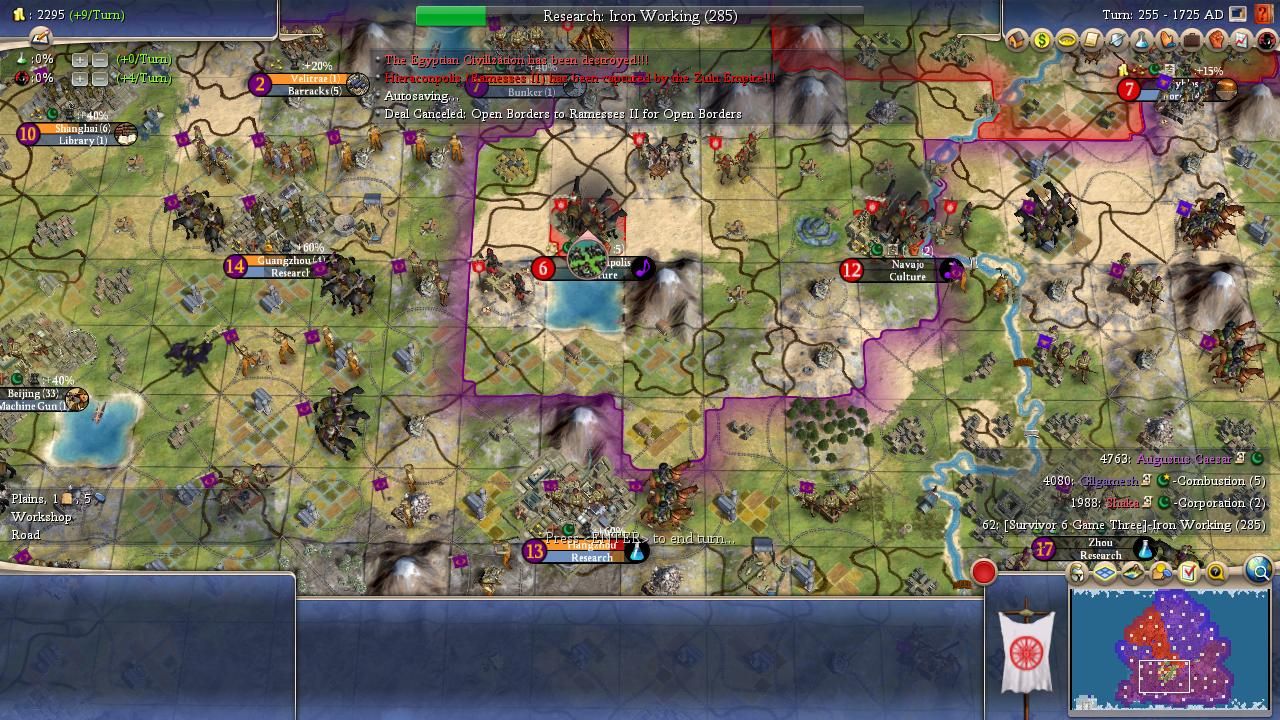
Ramesses had a great setup this game, and could easily have won. He had a great start with a well-spread early religion, a favorable diplomatic situation, and plenty of land, and successfully fought off an early Sumerian assault - only to make the most boneheaded move of the game and sign his amazing Holy City over in a peace deal. 

 Even without that Holy City, he did decently, running with the leaders for most of the rest of his game, but then he made a second terrible move by converting to a religion that nobody else practiced. That, combined with his propensity to under-build military, doomed him. It was a great setup, but one that he completely threw away.
Even without that Holy City, he did decently, running with the leaders for most of the rest of his game, but then he made a second terrible move by converting to a religion that nobody else practiced. That, combined with his propensity to under-build military, doomed him. It was a great setup, but one that he completely threw away.
This game had been very peaceful for a long time, but now we'd just lost half the field in the space of 70 turns. Coming out of the conquest of Egypt, Augustus was in the strongest position, having had a good 30+ turns to peacefully consolidate his conquests and continue building up while the other two fought, and as a result he had a small but definite lead over Gilgamesh. He'd left things uncertain for a while by putting off Rifling research for ages, researching techs like Combustion and Assembly Line first, but Gilgamesh's slow pace of conquest gave him enough time to do this and still pick up Rifling in time to achieve military parity and even a slight lead. Gilgamesh was in a strong second place, but it looked like he wouldn't be able to win unless he pulled off a Cultural victory or succeeded in a daring attack against Rome. And then Shaka was still around too, hopelessly far behind but still tagging along, hoping for one of the other two to be torn apart and let him squeak by into second place. Even though all three leaders were still practicing Islam here, it seemed that Augustus was at odds and likely to come to blows with Shaka and Gilgamesh at some point. Peaceweight differences and several war declarations had soured relations to the point where those two sides were now just cautious towards one another, and as it turned out, we didn't have to wait long at all...
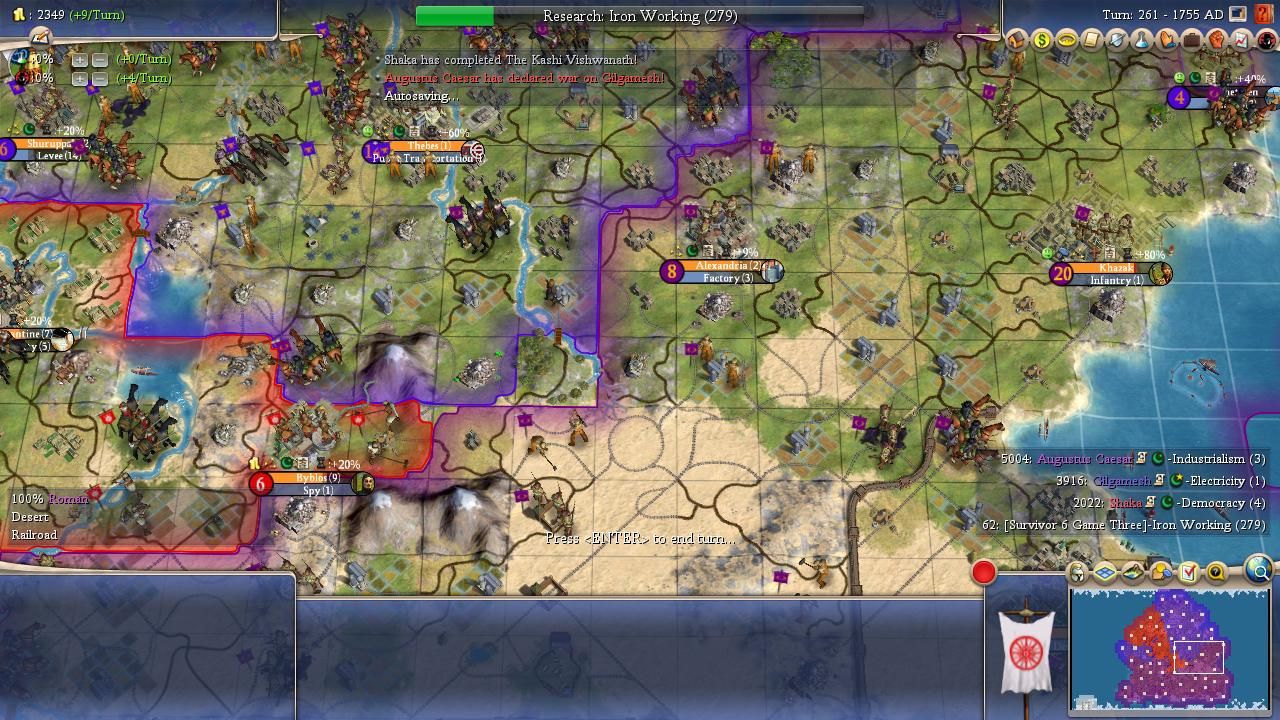
Just a few turns after Ramesses's elimination, Augustus declared war on Gilgamesh - triggering the climactic showdown to determine the winner once and for all. The war proceeded curiously slowly and undecisively at first, both leaders starting out by just marching big stacks from little cities stuck behind each others' cultural holdings into their own territory. Then Augustus just left his big stack sitting next to his border city for about 5 turns continuing to do absolutely nothing with this war that he had declared. Eventually, though, both leaders got on the move, and the fighting began in earnest. They exchanged units and cities at a fairly even rate to start with, as the two armies struck in two different locations, but soon enough, a difference started to show. Augustus researched Industrialism at the start of the war to unlock tanks, and Gilgamesh had the option to do the same, but instead he chose to avoid it just like Augustus had avoided Rifling earlier, going after the likes of Artillery, Rocketry, and Satellites first. This delay was proving fatal for Gilgamesh, as facing tanks with no tanks started to wear on his army more and more, and Augustus started to inflict heavy casualties on him. As usual, the power graph told the story, with Gilgamesh soon falling to less than half of Augustus's rating.
Before long, Augustus had purged his territory of Sumerian fighters, recaptured the taken border cities, and started pushing into Gilgamesh's core. It was now clear that Augustus was going to win the game - the real question was, could Gilgamesh hold on to second place, or would Augustus take out enough of his cities before hitting the Domination threshold for Shaka to come in second? Then Augustus hit an unexpected snag at the Sumerian city of Eridu. Multiple Roman stacks assaulted the city, yet failed to capture it, as Gilgamesh mounted a heroic last stand, and the war simply stalled out for a while. But even this last stand couldn't last forever - Gilgamesh's only source of oil was on the Roman border, and Augustus was able to pillage it to ensure that, even with the proper techs, Sumeria couldn't train any tanks or gunships. That left Gilgamesh stuck with only weaker units, and between that and Augustus's now-enormous production edge, he just couldn't keep up, especially after Augustus teched Robotics for mech infantry. Augustus finally punched through at Eridu, and from there, it was a total slaughter of Sumeria. Gilgamesh was done, unable to put up any meaningful resistance, and Rome soon swallowed up his land. He was sent reeling back into third place, as Shaka just sat on the sidelines, watching himself move into a playoff position while not daring to get involved, and suddenly the question was now whether Gilgamesh would even survive. Augustus dilly-dallied at the end of his conquest, sending small groups of units all over without any major attacks on Gilgamesh's final cities, pushing the finish date later and later. Gilgamesh was reduced to just a handful of barely-defended cities, but could he hold on?
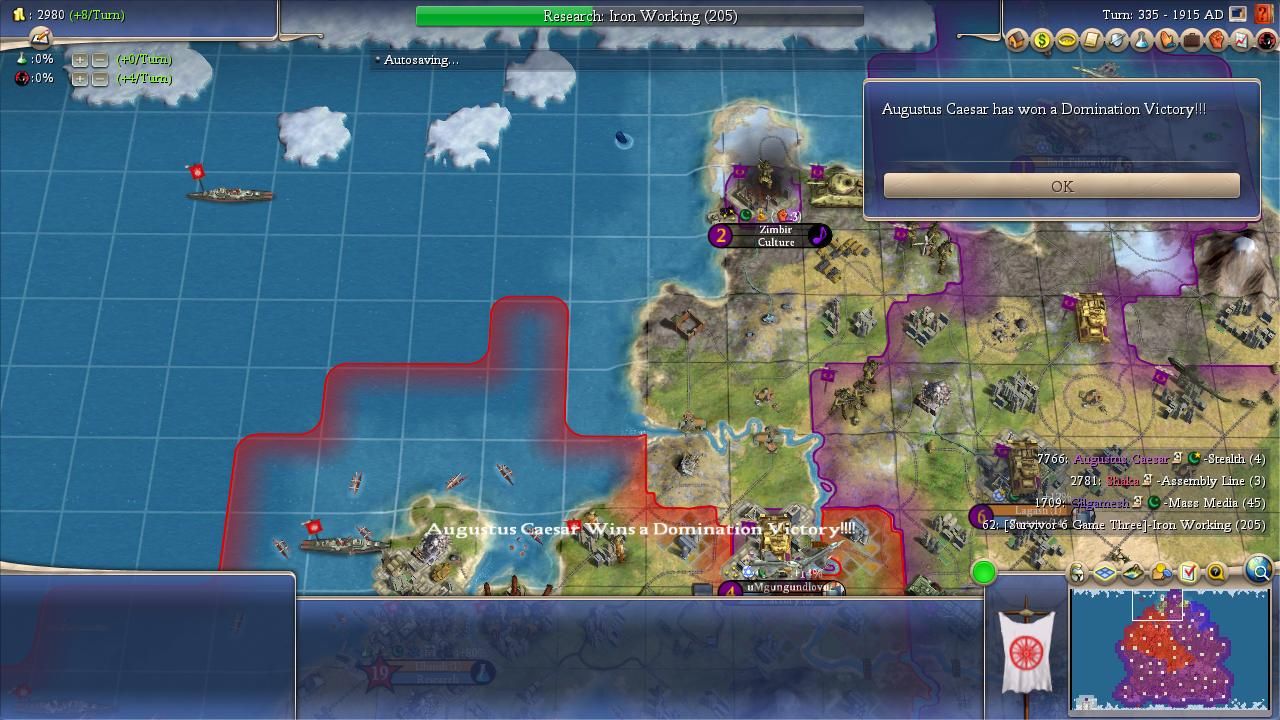
Yes, just barely! As it turned out, Gilgamesh had a single city left, with two infantry defenders, when Augustus finally moved over the Domination threshold to claim his first win in AI Survivor history. By the tiniest of margins, Gilgamesh survived to join the increasingly-stacked Wildcard game. Gilgamesh was dealt a bad hand in this game, and mostly played it well, getting every mile of land he could despite his cramped start and successfully building into a solid position. But the smart next move would've been to backstab Shaka - Gilgamesh could've rolled over him with ease, and that would've put him in a competitive position with Ramesses and Augustus. Gilgamesh's fatal mistake was refusing to take advantage of that opportunity, instead attacking the stronger Ramesses and failing to win decisively. He was still in contention thanks to Ramesses signing over Memphis, using that advantage to stay relevant throughout the game, and a well-timed aggressive strike let him still conquer Egypt later on. But by that point it was too late to catch up to the runaway Augustus. Gilgamesh got a bit shafted with the map here, mostly played well, and possibly deserved second place, but his failure to go for the easy prey or make a decisive early strike also make his Wildcard finish not wholly undeserved.
Meanwhile, Augustus was dealt a very favorable hand in this match, with a nice open, isolated start, nobody expanding towards him early, one neighbor that was always peaceful, another that was woefully inert, and nobody attacking him the entire game - yet he also played his hand very well. He expanded at a reasonable rate, taking plenty of land without crashing his economy to start him off in a strong position. Then, after building to a strong status, he attacked and steamrolled his weaker neighbor at a time when everybody was otherwise occupied. He was efficient enough to finish in time to consolidate and build for 30 turns while Gilgamesh chewed through Ramesses, then almost immediately attacked Gilgamesh to seal the deal, and was able to come out the victor. Augustus had some good breaks, but he also played capably and deserves this, his third career playoff spot.
Finally, Shaka of all leaders manages to get by in second place to claim his fourth career spot in the playoffs. In direct contrast to Augustus, Shaka was dealt a terrible hand in this game, stuck in a tiny corner of the continent next to a pair of culture-focused leaders, always very cramped and never having a chance to be a top leader, and he didn't help his case any by putting off Mysticism and culture in his cities for so long - two of his core cities had flipped to Gilgamesh by the end of the game! But he also never gave up and never stopped fighting for his place. He threw down as many cities as he could early on, attacked his only decent option in the similarly weak Asoka, and while he was never able to gain significant ground there on his own, he eventually got some spoils when the other leaders came to cut up India. Then he was able to coordinate attacks on Ramesses with Gilgamesh, and while on his own he probably would've lost, in this situation he was able to take a handful of cities and stay in the game. Then, when the two big dogs went at it, the normally-crazy warmonger was smart enough to sit back and watch, rather than making a suicidal war declaration, and was rewarded, coming in second place by virtue of all of the other leaders getting torn apart. He had a very good break in this game by never getting picked on by a stronger leader, but he also was wise enough to never declare a war he couldn't handle, and getting to the playoffs from that horrible start is truly impressive no matter how good of a break it took.
Overall, this was a game that felt like it had quite a few important events that shaped the result. Early on, the tenor of this match was set by the eastern civs' much better performance compared to their western counterparts, establishing three leaders in contention and three also-rans. The biggest early turning point was Ramesses' terrible move of signing his best city over to Gilgamesh, thus keeping the Sumerian in contention and setting the Egyptian back. Another big turning point was Ramesses' equally terrible move of converting to a minority religion, setting the target on his back and paving the way for his elimination. The other important turning points were the various decisive attacks made later on - Gilgamesh's attack that broke Asoka's back, Augustus's attack on Qin that resulted in him doubling his territory, Shaka and Gilgamesh's attack that eliminated Ramesses but also gave time for Augustus to regroup, and finally Augustus's decisive strike against Gilgamesh to put a lid on the game. This game played out like a boiling pot of water - slowly heating up for the first 175 turns, with a couple of interesting developments but not a lot happening, then boiling over for an action-packed end, with one decisive war following another for the rest of the game without a break. It was another fun ride, with plenty of twists and turns and a final result that only three person were able to predict correctly. Thanks as always to Sullla for running this, and all of you viewers/readers for giving it a reason to exist!



